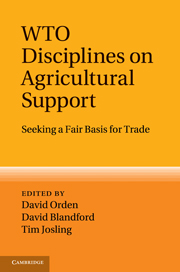Book contents
- Frontmatter
- Contents
- List of figures
- List of tables
- Notes on contributors
- Preface
- List of acronyms
- PART I overview of domestic support issues and WTO rules
- PART II Developed countries: have high levels of support come down?
- PART III Developing countries: will low levels of support rise?
- PART IV Looking forward: can fair markets be achieved?
- Appendix A Domestic support provisions of the Agreement on Agriculture
- Appendix B Domestic support provisions of the Doha draft modalities
- Index
Preface
Published online by Cambridge University Press: 11 April 2011
- Frontmatter
- Contents
- List of figures
- List of tables
- Notes on contributors
- Preface
- List of acronyms
- PART I overview of domestic support issues and WTO rules
- PART II Developed countries: have high levels of support come down?
- PART III Developing countries: will low levels of support rise?
- PART IV Looking forward: can fair markets be achieved?
- Appendix A Domestic support provisions of the Agreement on Agriculture
- Appendix B Domestic support provisions of the Doha draft modalities
- Index
Summary
Agricultural issues are particularly contentious in international trade negotiations. Many of the problems stem from the trade impacts of domestic support policies designed to maintain and stabilize farm incomes. When the World Trade Organization was launched in 1995, agricultural domestic support was brought under its disciplines. Certain trade-distorting support, evaluated in a specific manner, became subject to limits and all support measures to rules-based scrutiny. The economic objective underlying these legal disciplines was to reduce distortions in world agricultural markets. But the rules left countries with wide discretion over the forms and levels of support they provide to their farmers. Fifteen years later, subsequent negotiations in the Doha Round that have attempted to strengthen the initial rules and tighten the commitments have not resulted in an agreement.
This book examines in depth the many compliance and evaluation issues related to WTO disciplines on domestic support. Part one sets up the analysis. The key analytical questions that arise around disciplining domestic support are laid out in Chapter 1. The second chapter provides the necessary institutional background about the negotiation of the Agreement on Agriculture, its fundamental rules, the implementation experience through the WTO's Committee on Agriculture and dispute settlement cases, and the enhanced but complex proposals on domestic support that emerged in the Doha negotiations.
The second and third parts of the book (Chapters 3–10) present assessments of the domestic support notified to the WTO for compliance verification for eight developed and middle-income developing countries.
- Type
- Chapter
- Information
- WTO Disciplines on Agricultural SupportSeeking a Fair Basis for Trade, pp. xvii - xxPublisher: Cambridge University PressPrint publication year: 2011
- 1
- Cited by



